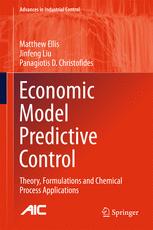

Most ebook files are in PDF format, so you can easily read them using various software such as Foxit Reader or directly on the Google Chrome browser.
Some ebook files are released by publishers in other formats such as .awz, .mobi, .epub, .fb2, etc. You may need to install specific software to read these formats on mobile/PC, such as Calibre.
Please read the tutorial at this link: https://ebookbell.com/faq
We offer FREE conversion to the popular formats you request; however, this may take some time. Therefore, right after payment, please email us, and we will try to provide the service as quickly as possible.
For some exceptional file formats or broken links (if any), please refrain from opening any disputes. Instead, email us first, and we will try to assist within a maximum of 6 hours.
EbookBell Team

5.0
38 reviewsThis book presents general methods for the design of economic model predictive control (EMPC) systems for broad classes of nonlinear systems that address key theoretical and practical considerations including recursive feasibility, closed-loop stability, closed-loop performance, and computational efficiency. Specifically, the book proposes:
The proposed methods employ a variety of tools ranging from nonlinear systems analysis, through Lyapunov-based control techniques to nonlinear dynamic optimization. The applicability and performance of the proposed methods are demonstrated through a number of chemical process examples.
The book presents state-of-the-art methods for the design of economic model predictive control systems for chemical processes.In addition to being mathematically rigorous, these methods accommodate key practical issues, for example, direct optimization of process economics, time-varying economic cost functions and computational efficiency. Numerous comments and remarks providing fundamental understanding of the merging of process economics and feedback control into a single framework are included. A control engineer can easily tailor the many detailed examples of industrial relevance given within the text to a specific application.
The authors present a rich collection of new research topics and references to significant recent work making Economic Model Predictive Control an important source of information and inspiration for academics and graduate students researching the area and for process engineers interested in applying its ideas.